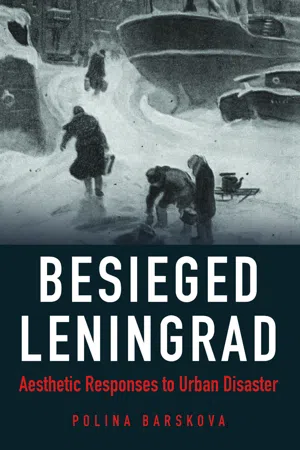
- 232 pages
- English
- ePUB (mobile friendly)
- Available on iOS & Android
About this book
During the 872 days of the Siege of Leningrad (September 1941 to January 1944), the city's inhabitants were surrounded by the military forces of Nazi Germany. They suffered famine, cold, and darkness, and a million people lost their lives, making the siege one of the most destructive in history. Confinement in the besieged city was a traumatic experience. Unlike the victims of the Auschwitz concentration camp, for example, who were brought from afar and robbed of their cultural roots, the victims of the Siege of Leningrad were trapped in the city as it underwent a slow, horrific transformation. They lost everything except their physical location, which was layered with historical, cultural, and personal memory. In Besieged Leningrad, Polina Barskova examines how the city's inhabitants adjusted to their new urban reality, focusing on the emergence of new spatial perceptions that fostered the production of diverse textual and visual representations. The myriad texts that emerged during the siege were varied and exciting, engendered by sometimes sharply conflicting ideological urges and aesthetic sensibilities. In this first study of the cultural and literary representations of spatiality in besieged Leningrad, Barskova examines a wide range of authors with competing views of their difficult relationship with the city, filling a gap in Western knowledge of the culture of the siege. It will appeal to Russian studies specialists as well as those interested in war testimonies and the representation of trauma.
Frequently asked questions
- Essential is ideal for learners and professionals who enjoy exploring a wide range of subjects. Access the Essential Library with 800,000+ trusted titles and best-sellers across business, personal growth, and the humanities. Includes unlimited reading time and Standard Read Aloud voice.
- Complete: Perfect for advanced learners and researchers needing full, unrestricted access. Unlock 1.4M+ books across hundreds of subjects, including academic and specialized titles. The Complete Plan also includes advanced features like Premium Read Aloud and Research Assistant.
Please note we cannot support devices running on iOS 13 and Android 7 or earlier. Learn more about using the app.
Information
Table of contents
- Cover Page
- Title Page
- Copyright Page
- Contents
- Acknowledgments
- Transliteration and Translations
- Introduction
- 1. Walking through the Siege: Routes, Routines, and the Paths of the Imagination
- 2. Spatialized Allegory: Speaking Dystrophy Otherwise
- 3. Paradoxes of Siege Vision: Darkness, Blindness, and Knowledge
- 4. Framing the Siege Sublime: Urban Spectacle and Cultural Memory
- 5. The Spatial Practice of Siege Reading
- 6. Reading into the Siege: Heterochronic Directions of Escapist Reading
- Notes
- Bibliography
- Index